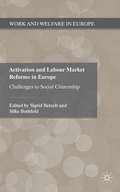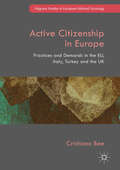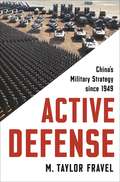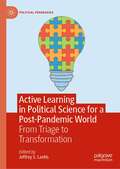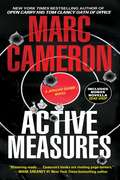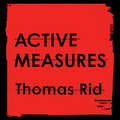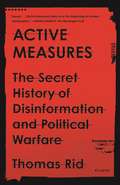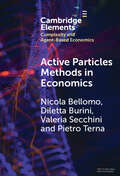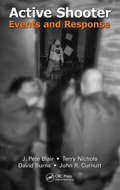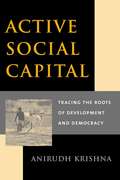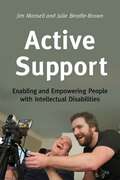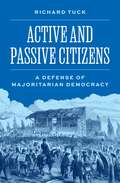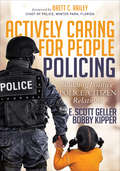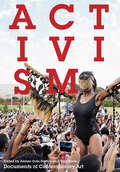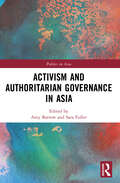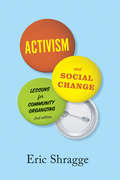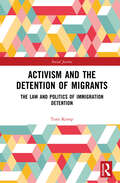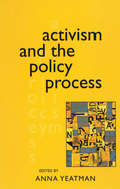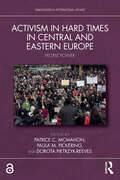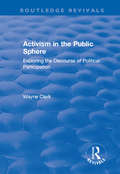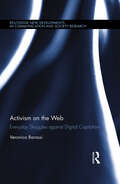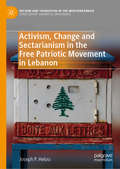- Table View
- List View
Activation Policies and the Protection of Individual Rights: A Critical Assessment of the Situation in Denmark, Finland and Sweden
by Paul Van AerschotIn Denmark, Finland and Sweden the evolution of administrative law, including social welfare law, has been marked by a shift towards a stronger protection of the recipient's individual rights. The adoption of activation policies targeting recipients of social assistance has highlighted the tensions between decision-making concerning the implementation of these policies and the legislative efforts to promote the realisation of individual rights in the field of social welfare. An examination of the legislation in question and its implementation conditions shows that the realisation of individual rights is subordinated to the pursuit of organisational and other objectives. The findings of the study are used to formulate proposals for the promotion of individual rights based on the Nordic egalitarian model of citizenship. This critical assessment of activation policies should be of broad international appeal. It will be of interest to researchers in social policy, as well as those concerned with protection of rights.
Activation and Labour Market Reforms in Europe: Challenges to Social Citizenship
by Sigrid Betzelt Silke BothfeldThis book analyzes in what way activation policies impact on given patterns of social citizenship that predominate in national contexts. It argues that the liberal paradigm of activation introduced into labour market policies in all Western European states challenges the specific patterns of social citizenship in each country.
Active Assisted Living: Anwendungsszenarien und Lösungsansätze für ein selbstbestimmtes Leben
by Marcel Sailer Andreas MahrIn dem vorliegenden Open-Access-Buch identifizieren Studierende und Lehrende interprofessionell Entwicklungen und Problemfelder der Assistiven Technologien. Diese halten zunehmend Einzug ins Leben versorgungsbedürftiger, häufig älterer Menschen. Nach einigen Jahren der Entwicklung kann konstatiert werden, dass der Transfer von Entwicklung zur Anwendung im Alltag infolge unterschiedlicher Perspektiven und Zielsetzungen nur unzureichend stattfindet. Die Beitragsautoren bieten kreative Lösungsansätze, die zu einer nachhaltigen Umsetzung führen sollen.Dies ist ein Open-Access-Buch.
Active Borders in Europe: Identity and Collective Memory in the Cross-Border Space (Contributions to Political Science)
by Karel B. MüllerThis book explores how identities, public spheres and collective memories are being transformed in cross-border areas, contributing to the broad sociological context of Europeanization. Offering case studies on the German-Czech-Austrian, and Czech-Polish-German borderlands, the book introduces original primary data on cross-border cooperation. This data is interpreted using the concept of active borders, which approaches borders as a source of multicultural competence and cognitive capacity. In turn, the authors argue that Europeans need to treat borders, both territorial and symbolic, as specific cultural forms. Active borders allow an unprecedented level of cross-border cooperation and integration, and foster a better understanding of differences, rather than re-embedding them or constructing others. Accordingly, the authors contend that active borders promote more dynamic, open and resilient societies, and represent crucial prerequisites for the success of the European integration project.
Active Citizenship in Europe: Practices and Demands in the EU, Italy, Turkey and the UK (Palgrave Studies in European Political Sociology)
by Cristiano BeeThis book evaluates the role that civic engagement, political participation and active citizenship can play in promoting the establishment of a European polity. The chapters included here examine how the practice of active citizenship is managed and constructed in the context of a European drive to increase civic engagement and political participation in three member states (Portugal, Italy and the UK) and one accession country (Turkey). Looking at both processes and policies promoting active citizenship at the European and national levels, this book uncovers current discourses as well as political priorities and values that surround the activities of non- governmental organizations (NGOs). Of particular interest are debates about the nature and level of civic and political participation and engagement of marginal groups (women, youths, migrants and minorities) as they are particularly vulnerable to social exclusion. The book focuses on the interaction between institutions and civil society actors, addressing a number of questions related to their reciprocal role in influencing, shaping, criticising or disregarding certain political priorities. This book was published as a special issue of the Journal of Civil Society.
Active Defense: China's Military Strategy since 1949 (Princeton Studies in International History and Politics #167)
by M. Taylor FravelWhat changes in China’s modern military policy reveal about military organizations and strategySince the 1949 Communist Revolution, China has devised nine different military strategies, which the People’s Liberation Army (PLA) calls “strategic guidelines.” What accounts for these numerous changes? Active Defense offers the first systematic look at China’s military strategy from the mid-twentieth century to today. Exploring the range and intensity of threats that China has faced, M. Taylor Fravel illuminates the nation’s past and present military goals and how China sought to achieve them, and offers a rich set of cases for deepening the study of change in military organizations.Drawing from diverse Chinese-language sources, including memoirs of leading generals, military histories, and document collections that have become available only in the last two decades, Fravel shows why transformations in military strategy were pursued at certain times and not others. He focuses on the military strategies adopted in 1956, 1980, and 1993—when the PLA was attempting to wage war in a new kind of way—to show that China has pursued major change in its strategic guidelines when there has been a significant shift in the conduct of warfare in the international system and when China’s Communist Party has been united.Delving into the security threats China has faced over the last seven decades, Active Defense offers a detailed investigation into how and why states alter their defense policies.
Active Learning in Political Science for a Post-Pandemic World: From Triage to Transformation (Political Pedagogies)
by Jeffrey S. LantisThis book features valuable conversations about how COVID-19 has changed how we teach and even who we are as instructors in political science. This project devotes special attention to how our pedagogy in political science has evolved from ‘triage’ to transformation over the course of the pandemic. This book, part of the Palgrave Macmillan Political Pedagogies series, presents a variety of innovations in political science teaching (from “ungrading” to the flipped classroom) and offers systematic reflections on how our approaches to teaching and learning have been forever changed.
Active Measures (A Jericho Quinn Thriller #8)
by Marc CameronOLD ENEMIES NEVER DIE Cuba and the United States are in talks to normalize relations, something the old guard on the Communist-controlled island has vowed to stop—by any means necessary. Zayda de la Guardia, a rogue general in the Cuban security services, has gotten his hands on a nuclear weapon left over from the Cold War. He plans to launch it on Miami, an attack that could kill millions. There&’s just one thing standing in his way: special agent Jericho Quinn and his team have traveled undercover to Cuba to unravel de la Guardia&’s plot before it ignites a nuclear holocaust. Thrown into a secret prison, pursued by assassins, and trapped on the tiny island during one of the worst hurricanes of the century, Quinn and his crew must survive a trial by fire to prevent an international confrontation that would make the Cuban Missile Crisis look like a fist fight. Praise for Marc Cameron&’s Open Carry &“Cameron, who has nearly three decades in law enforcement and a stint as a U.S. Marshal, keeps all the plot points delicately balanced and at the same time creates sympathetic heroes, depraved villains, and nail-biting action. Readers will eagerly await his next.&”—Publishers Weekly,STARRED REVIEW &“Cameron effectively combines investigation and straight-ahead action . . . a compelling, never-give-an-inch hero who will appeal to Jack Reacher fans.&”—Booklist
Active Measures: A History of Disinformation
by Thomas RidWe live in an age of organized deception. Spy agencies pour vast resources into hacking, leaking, and forging data, often with the goal of weakening the very foundation of liberal democracy: trust in facts. Thomas Rid, a renowned expert on technology and national security, was one of the first to sound the alarm. Even before the 2016 election, he warned that Russian military intelligence was "carefully planning and timing a high-stakes political campaign" to disrupt the democratic process. But as crafty as such so-called active measures have become, they are not new.In this astonishing journey through a century of secret psychological war, Rid reveals for the first time some of history's most significant operations - many of them nearly beyond belief. A White Russian ploy backfires and brings down a New York police commissioner; a KGB-engineered, anti-Semitic hate campaign creeps back across the Berlin Wall; the CIA backs a fake publishing empire, run by a former Wehrmacht Uboat commander that produces Germany's best jazz magazine.Rid tracks the rise of leaking, and shows how spies began to exploit emerging internet culture many years before WikiLeaks. Finally, he sheds new light on the 2016 US election, especially the role of the infamous "troll farm" in St. Petersburg, as well as a much more harmful attack that unfolded in the shadows. We live in strange times. Only the perverse logic of active measures can explain them.
Active Measures: The Secret History of Disinformation and Political Warfare
by Thomas RidThis revelatory and dramatic history of disinformation traces the rise of secret organized deception operations from the interwar period to contemporary internet troll farmsWe live in the age of disinformation—of organized deception. Spy agencies pour vast resources into hacking, leaking, and forging data, often with the goal of weakening the very foundation of liberal democracy: trust in facts. Thomas Rid, a renowned expert on technology and national security, was one of the first to sound the alarm. More than four months before the 2016 election, he warned that Russian military intelligence was “carefully planning and timing a high-stakes political campaign" to disrupt the democratic process. But as crafty as such so-called active measures have become, they are not new. The story of modern disinformation begins with the post-Russian Revolution clash between communism and capitalism, which would come to define the Cold War. In Active Measures, Rid reveals startling intelligence and security secrets from materials written in more than ten languages across several nations, and from interviews with current and former operatives. He exposes the disturbing yet colorful history of professional, organized lying, revealing for the first time some of the century’s most significant operations—many of them nearly beyond belief. A White Russian ploy backfires and brings down a New York police commissioner; a KGB-engineered, anti-Semitic hate campaign creeps back across the Iron Curtain; the CIA backs a fake publishing empire, run by a former Wehrmacht U-boat commander, that produces Germany’s best jazz magazine. Rid tracks the rise of leaking, and shows how spies began to exploit emerging internet culture many years before WikiLeaks. Finally, he sheds new light on the 2016 election, especially the role of the infamous “troll farm” in St. Petersburg as well as a much more harmful attack that unfolded in the shadows.Active Measures takes the reader on a guided tour deep into a vast hall of mirrors old and new, pointing to a future of engineered polarization, more active and less measured—but also offering the tools to cut through the deception.
Active Particles Methods in Economics: New Perspectives in the Interaction between Mathematics and Economics (Elements in Complexity and Agent-based Economics)
by Nicola Bellomo Diletta Burini Valeria Secchini Pietro TernaThe aim of this Element is to understand how far mathematical theories based on active particle methods have been applied to describe the dynamics of complex systems in economics, and to look forward to further research perspectives in the interaction between mathematics and economics. The mathematical theory of active particles and the theory of behavioural swarms are selected for the above interaction. The mathematical approach considered in this work takes into account the complexity of living systems, which is a key feature of behavioural economics. The modelling and simulation of the dynamics of prices within a heterogeneous population is reviewed to show how mathematical tools can be used in real applications.
Active Shooter Events and Response
by David Burns John P. Blair Terry Nichols John R. CurnuttThe Columbine tragedy on April 20, 1999 began a new era in law enforcement as it became apparent that the police response to such mass shootings must be drastically altered. By the time the Sandy Hook Elementary School shooting occurred on December 14, 2012, outdated police response strategies had been replaced with new, aggressive tactics used by
Active Social Capital: Tracing the Roots of Development and Democracy
by Anirudh KrishnaThe idea of social capital allows scholars to assess the quality of relationships among people within a particular community and show how that quality affects the ability to achieve shared goals. With evidence collected from sixty-nine villages in India, Krishna investigates what social capital is, how it operates in practice, and what results it can be expected to produce. Does social capital provide a viable means for advancing economic development, promoting ethnic peace, and strengthening democratic governance? The world is richer than ever before, but more than a fifth of its people are poor and miserable. Civil wars and ethnic strife continue to mar prospects for peace. Democracy is in place in most countries, but large numbers of citizens do not benefit from it. How can development, peace and democracy become more fruitful for the ordinary citizen? This book shows how social capital is a crucial dimension of any solution to these problems.
Active Support
by Jim Mansell Julie Beadle-BrownActive Support is a proven model of care that enables and empowers people with intellectual disabilities to participate fully in all aspects of their lives. This evidence-based approach is particularly effective for working with people with more severe disabilities, and is of growing interest to those responsible for providing support and services. The authors provide a comprehensive overview of Active Support and how it can be used in practice, based on the theory and research underpinning the methods involved. They describe how to engage people with intellectual disabilities in meaningful activity as active participants, and look at the communication style needed to foster positive relationships between carers and the people they are supporting. Highlighting the main issues for those trying to put Active Support into practice, they explain what is needed on a day-to-day basis to support the implementation, improvement and maintenance of the approach, along with possible solutions for the difficulties they may encounter. Finally, they look at how to integrate Active Support with other person-centred approaches, drawing on examples from various organisations and individual case studies. The definitive text on Active Support, this book will be essential reading for anyone professionally concerned with the quality of life of people with intellectual disabilities, including psychologists, behaviour specialists, social workers, care managers, occupational therapists and inspectors and regulators of services, as well as families.
Active and Passive Citizens: A Defense of Majoritarian Democracy (The University Center for Human Values Series #56)
by Richard TuckA powerful case for why majority rule—not representation—is the defining feature of democratic politicsThe idea that democratic governance rests on active self-rule by citizens plays surprisingly little part in current theories of democracy, which instead stress the importance of representation by elected, appointed, or randomly selected bodies such as legislatures, courts, and juries. This would have astonished eighteenth-century theorists of democracy, who viewed universal suffrage and majoritarian voting as the sole criteria for democratic politics. Active and Passive Citizens defends the view of these earlier thinkers, asserting that individual agency is the very essence of democracy.In this provocative and lucidly argued book, Richard Tuck draws on the distinction made by the Abbé Sieyès, a leading political theorist of the French Revolution, between &“active&” citizens (the electorate) and &“passive&” ones (those who are represented by the institutions of the state). Tuck traces our current representative view of democracy to Sieyès and contrasts him with Rousseau, a theorist of active self-rule by the people. Tuck argues that modern theories of democracy have effectively turned us into passive citizens and calls for a renewal of a majoritarian democracy that realizes the full potential of active citizenship.Based on the prestigious Tanner Lectures delivered at Princeton University&’s Center for Human Values, Active and Passive Citizens is edited and introduced by Stephen Macedo and includes commentary by political theorists Simone Chambers, Joshua Cohen, John Ferejohn, and Melissa Schwartzberg.
Actively Caring for People Policing: Building Positive Police/Citizen Relations
by E. Scott Geller Bobby KipperA revolutionary new approach to policing that puts people over punishment. Experts have struggled to define the term &“police culture.&” For most, this label means a reactive approach to keeping people safe by using punitive consequences to punish or detain the perpetrators. The result: More attention is given to the negative, reactive side of policing than a positive, proactive approach to preventing crime by cultivating an interdependent culture of residents looking out for the safety, health, and well-being of each other. In Actively Caring for People Policing, authors E. Scott Geller and Bobby Kipper show how police officers can play a critical and integral role in achieving such a community of compassion—an Actively Caring for People (AC4P) culture. With AC4P policing, consequences are used to increase the quantity and improve the quality of desired behavior. Police officers are educated about the rationale behind using more positive than negative consequences to manage behavior, and then they are trained on how to deliver positive consequences in ways that help to cultivate interpersonal trust and AC4P behavior among police officers and the citizens they serve. The result: humanistic behaviorism to enhance long-term positive relations between police officers and the citizens they serve, thereby preventing interpersonal conflict, violence, and harm.
Activism (Whitechapel: Documents of Contemporary Art)
by Afonso Dias Ramos Tom SnowAn edited collection that addresses the vital intersection of contemporary art and activism in this watershed cultural moment.Activism is a critical point of contention for institutions and genealogies of contemporary art around the world. Yet artists have consistently engaged in activist discourse, lending their skills to social movements, and regularly participating in civil and social rights campaigns while also boycotting cultural institutions and exerting significant pressure on them. This timely volume, edited by Tom Snow and Afonso Ramos, addresses an extraordinary moment in debates over the institutional frameworks and networks of art including large-scale direct actions, as well as a radical rethinking of art venues and urban spaces according to racial, class, or gender-based disparities, including demonstrations against the extractive and exploitative practices of neoliberal accumulation and climate catastrophe.From ACT UP and its affiliate groups since the dawn of the AIDS crisis to the counter-spectacle and street theatrics of the so-called Arab Spring and Occupy, to ongoing protest movements such as Black Lives Matter, Rhodes Must Fall, and Decolonize This Place, activist aesthetics has proven increasingly difficult to define under traditional classifications. Resurgent campaigns for decolonial reckoning, ecological justice, gender equality, indigenous rights and antiracist pedagogies indicate that the role of activism in contemporary art practice urges a critical reassessment. One pressing question is whether contemporary art&’s most radical politics now takes place outside, against, or in spite of, conventional sites of display such as museums, biennials, and galleries.Artists surveyed include: ACT UP, Basel Abbas & Ruanne Abou-Rahme, Allora & Calzadilla, Tania Bruguera, Black Audio Film Collective, Chto Delat, Andrea Fraser, Nan Goldin, Sanja Iveković, Gulf Labor, Amar Kanwar, Leslie Labowitz, Liberate Tate, Sethembile Msezane, Zanele Muholi, Jan Nikolai Nelles & Nora Al-Badri, Decolonize This Place, Michael Rakowitz, Oliver Ressler. Writers include: Dave Beech, Judith Butler, Amílcar Cabral, Elias Canetti, Douglas Crimp, Jodi Dean, Gilles Deleuze, T.J. Demos, Nina Dubrovsky, Süreyyya Evren, Catherine Flood, Matthew Fuller, David Graeber, Gavin Grindon Félix Guattari, Brian Holmes, Carrie Lambert-Beatty, Lucy Lippard, Yates McKee, MTL Collective, Gregory Sholette, Françoise Vergès, Peter Weiss, Eyal Weizman.
Activism and Authoritarian Governance in Asia (Politics in Asia)
by Amy Barrow and Sara FullerThis interdisciplinary book offers a new analysis of the concepts, spaces, and practices of activism that emerge under diverse authoritarian modes of governance in Asia. Demonstrating the limitations of existing conceptual approaches in accounting for activism in Asia, the book also offers new understandings of authoritarian governance practices and how these shape state-civil society relations. In conjunction with its tripartite theoretical framework, the book presents regional knowledge from an array of countries in Asia, with empirically rich contributions from both scholars and activists. Through in-depth case studies, the book offers new scholarly insights that highlight the ways in which activism emerges and is contested across Asia. As such, it will be of interest to students and scholars of Asian politics, law, and sociology.
Activism and Social Change: Lessons For Community And Local Organizing
by Eric ShraggeDrawing on over thirty years of experience in community development practice, Eric Shragge offers a unique historical perspective on activism, linking various forms of local organizing to the broader goal of fundamental social change. This new edition places contemporary community organizing in a post-9/11 context and includes a discussion of national and international organizing efforts—in the Middle East, in the Occupy movement, in European resistance to austerity measures, and in recent student protests in Quebec. A new chapter-length case study covering Shragge's long-term involvement with the Immigrant Workers Centre in Montreal offers one of the few English-language discussions of community organizing in Quebec. Activism and Social Change is an excellent core or supplementary text in courses on social movements, community organizing, or community development.
Activism and the Detention of Migrants: The Law and Politics of Immigration Detention (Social Justice)
by Tom KempThis book is an empirically grounded, critical engagement with the politics of immigration detention and deportation. Focusing on the constitutive tensions and political generativity within the activist practices of the anti-detention movement, this book examines the distinction between representational and post-representational political sensibilities. Representational politics centres on representing the interests of disenfranchised people to the state and public and operates primarily within the regime of immigration law. Post-representational politics focuses on working collaboratively with those in detention, to resist and challenge the deportation system. Since representational politics is the predominant political imaginary of migrant rights campaigning, the book focuses on illustrating and evaluating the role of post-representational politics. The book argues that the concept of post-representational politics is important for understanding and participating in radical opposition to state racism. This argument rests on the expanded possibilities it motivates of engaging with and resisting institutions that are poised to co-opt resistance; the attention it fosters to the situated power dynamics of political activities that collaborate with imprisoned people; and its sensitivity to the politically and conceptually generative capacities of everyday, embodied practices of resistance. To make this argument, this book employs innovative methodology to illuminate and engage with the practice-based thinking of activist movements about the concepts of solidarity, hospitality, witnessing and accountability. This book will be of interest to scholars and activists with interests in socio-legal studies of immigration and refugee law, as well as others in social movement studies, critical legal studies, border criminology and critical theory.
Activism and the Policy Process
by Anna YeatmanActivists - protecting rainforests, demanding increased childcare, developing local community housing, campaigning for AIDS funding or protecting consumers - are as much part of the political landscape as the media, parliament, peak industry groups, political parties or trade unions. This collection explores the idea of policy activism and its relationship to the processes that not only set but implement and deliver the policy agenda.Policy activists operate both inside and outside government. They include community-based organisers, activist bureaucrats, service providers and professionals.Policy activism has been barely explored in existing literature. This collection puts the idea on the map. It is an innovative contribution to the literature, using case studies across a broad range of policy areas.'This volume opens the window on an aspect of the policy process that rarely receives attention from students of politics or policy anywhere across the globe. The framework presented and the cases included in these pages provide a glimpse of the workings of a complex democracy, describing a range of actors responding creatively to the dynamics of social, political and economic change. It is fascinating to see how policy functions and social values appear to be more important to these processes than the formal structures of the government in which they are placed.' - Beryl A. Radin, Professor of Public Administration and Policy, State University of New York at Albany
Activism in Hard Times in Central and Eastern Europe: People Power (Innovations in International Affairs)
by Patrice C. McMahon Dorota Pietrzyk-Reeves Paula M. PickeringActivism in Hard Times in Central and Eastern Europe elevates the voices of civic activists from Central and Eastern Europe (CEE) and analyzes a wealth of information to generate new insights into how activism in the region manages to be vibrant, diverse, and consequential.Because of these countries’ unique historical trajectory, CEE activists have, in important ways, leap-frogged their counterparts in the West. Giving special attention to activists in Bosnia and Herzegovina (BiH), Hungary, Poland, Russia, and Ukraine, the book focuses on responses to the recent “hard times” – the shrinking of public space for civil society, democratic backsliding, polarization, and Russia’s war in Ukraine. The contributors contend that CEE activists provide important lessons for others confronting similar challenges around the world.The book is well-suited for a variety of undergraduate and graduate courses, such as comparative politics, human rights, global governance, social movements, Central and East European politics, and contemporary world politics. This timely and readable book, co-created by academics and activists and written in a conversational tone, will also be of interest to the interested public and practitioners. The book encourages readers to think differently about the role of civil society and activism, as well as about how new tools and polarizing dynamics affect activism in this region.Chapters 2, 3, 6 and 8 of this book are freely available as downloadable Open Access PDFs at http://www.taylorfrancis.com under a Creative Commons Attribution-Non Commercial-No Derivatives (CC-BY-NC-ND) 4.0 license.
Activism in the Public Sphere: Exploring the Discourse of Political Participation (Routledge Revivals Ser.)
by Wayne ClarkThis title was first published in 2000. Drawing upon fieldwork conducted with Amnesty International, the Labour Party, Tenants’ Associations and the Exodus collective, this work examines the nature of political activism. The author combines Habermasian theory and empirical fieldwork to critically analyze the nature of the political public sphere. While adopting a Habermasian approach, Clark recognizes the problems and limitations associated with notions of civil society and communicative action. An empirically formed critical stance is maintained throughout the work. Three main themes are drawn from this research: an analysis of structures of political participation; presentation of a typology of political activism ; analysis of the public process of participation. Essential reading for those studying public participation and its relationship to activism, as well as for students of politics, public policy and sociology.
Activism on the Web: Everyday Struggles against Digital Capitalism (Routledge New Developments in Communication and Society Research)
by Veronica BarassiActivism on the Web examines the everyday tensions that political activists face as they come to terms with the increasingly commercialized nature of web technologies and sheds light on an important, yet under-investigated, dimension of the relationship between contemporary forms of social protest and internet technologies. Drawing on anthropological and ethnographic research amongst three very different political groups in the UK, Italy and Spain, the book argues that activists’ everyday internet uses are largely defined by processes of negotiation with digital capitalism. These processes of negotiation are giving rise to a series of collective experiences, which are defined by the tension between activists’ democratic needs on one side and the cultural processes reinforced by digital capitalism on the other. In looking at the encounter between activist cultures and digital capitalism, the book focuses in particular on the tension created by self-centered communication processes and networked-individualism, by corporate surveillance and data-mining, and by fast-capitalism and the temporality of immediacy. Activism on the Web suggests that if we want to understand how new technologies are affecting political participation and democratic processes, we should not focus on disruption and novelty, but we should instead explore the complex dialectics between digital discourses and digital practices; between the technical and the social; between the political economy of the web and its lived critique.
Activism, Change and Sectarianism in the Free Patriotic Movement in Lebanon (Reform and Transition in the Mediterranean)
by Joseph P. HelouThis book explores the thirty-year trajectory of the Free Patriotic Movement that aimed to achieve the freedom, sovereignty and independence of Lebanon from the Lebanese political elite and Syrian hegemony. It sheds light on the movement’s activism, changes and sectarianism throughout the stages of movement emergence, persistence and party transformation. The author shows how the movement built on opportunities that culminated in its rise, both in civil society and nationally, despite a number of challenges. The book also reveals the formation of intricate units and communication channels to mobilize activism and increase commitment to the movement’s cause. While discussing the significance of Michel Aoun and Gebran Bassil to the future of the FPM, the author asserts that various party dimensions and practices are conditioned by regional and international politics.

